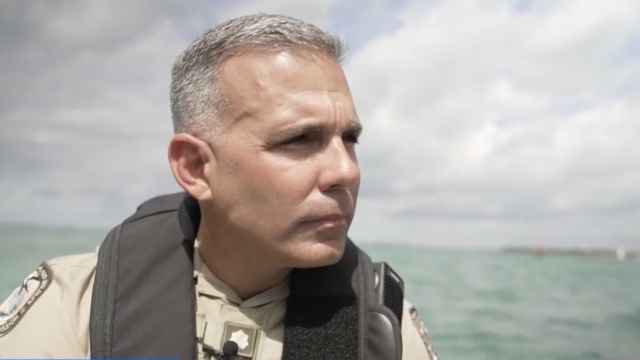As the closest U.S. state to Haiti, Florida's coast lies about 800 miles from that Caribbean nation, which is now gripped by gang violence.
Citing concerns about a potential migrant exodus, Florida's Republican Gov. Ron DeSantis launched additional patrols from state agencies, like the Florida Fish and Wildlife Conservation Commission.
It's a journey by sea that would take migrants across the treacherous waters of the Florida Straits.
"I think the voyage is extremely dangerous," said Florida Fish and Wildlife's Lt. Col. Alfredo Escanio.
Scripps News headed out on a patrol boat on Biscayne Bay, with Lt. Col. Escanio and Capt. Rafael Almagro. The duties assigned to Florida Fish and Wildlife are usually varied.
"Our officers are normally patrolling on, not only on offshore boats, but we also have inshore boats, airboats, buggies," Lt. Col. Escanio said. "We enforce all of the boating laws of the state, fish and wildlife laws, and we do general public safety."
That also includes intercepting migrants. Florida Fish and Wildlife found a boat several weeks ago in the Atlantic waters near Brevard County, Florida.
"We had two officers patrolling at night," Lt. Col. Escanio said, "and they stopped a vessel coming in with two smugglers and 25 Haitian migrants."
They are migrants who are fleeing a desperate situation, say Haitian-American activists.
"People are terrified. People are literally living their life not knowing if they're going to make it to the next day," said Paul Christian Namphy, political director with the Family Action Network Movement, a nonprofit organization helping Haitian migrants settle in Miami, which is home to the Little Haiti neighborhood.
He lived in Haiti for many years; his family members live just north of Port-au-Prince.
"Haiti is part of who we are," he said.
Namphy said he disagrees with Florida increasing the number of offshore patrols for Haitian migrants.
"The people coming are our sisters, brothers, mothers, fathers, sons, daughters who are fleeing for their lives, who are fleeing the killing, the kidnapping, the rape, the armed robbery that's happening on a daily basis in Port-au-Prince," Namphy said, "and we should be showing compassion and solution-finding, rather than militarization and scapegoating."
Out on the water, Lt. Col. Escanio told us his work boarding vessels is about safety and helping migrants, once they are spotted out at sea.
"They need medical aid. So, we'll get them to a medical facility or call for medical, get them transported to a medical facility. When that's not the situation, then we turn the migrants over to either Coast Guard or air marine operations of CPB, which is Customs and Border Protection," Lt. Col. Escanio said. "We are kind of the last line of defense for the state of Florida."
It is work that will continue out on the water, until Haiti's downward spiral comes to an end.
SEE MORE: Haiti's deep humanitarian, security crisis: US takes urgent action
Trending stories at Scrippsnews.com




